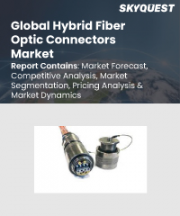
|
시장보고서
상품코드
1623933
광섬유 커넥터 시장 : 산업 분석, 규모, 점유율, 성장, 동향 및 예측(2025-2032)Fiber Optic Connectors Market: Global Industry Analysis, Size, Share, Growth, Trends, and Forecast, 2025 - 2032 |
||||||
주요 인사이트
- 광섬유 커넥터 시장 규모(2022년) : 83억 7,550만 달러
- 시장 규모 예측(2033년) : 187억 4,830만 달러
- 세계 시장 성장률(2023-2033년) : CAGR 12.20%
시장 성장 촉진요인:
광섬유 커넥터 시장은 고속 데이터 전송 및 광대역 용도에 대한 수요 증가로 인해 강력한 성장세를 보이고 있습니다. 클라우드 컴퓨팅, IoT 및 데이터 집약적 기술의 채택이 증가함에 따라 기존 구리 케이블에 비해 우수한 데이터 전송 속도를 제공하는 광섬유 커넥터에 대한 수요가 크게 증가하고 있습니다. 또한 비디오 스트리밍, 온라인 게임, 가상현실과 같은 광대역 용도의 인기가 높아지면서 시장 성장에 박차를 가하고 있습니다. 또한, 5G 네트워크의 출현으로 광섬유 커넥터의 채택이 가속화되고 있으며, 이는 원활하고 빠른 연결성을 구현하는 데 중요한 역할을 하고 있습니다.
시장 성장 억제요인 :
강력한 성장 궤도에도 불구하고 광섬유 커넥터 시장은 발전을 저해하는 문제에 직면해 있습니다. 인프라 및 유지보수 등 광섬유 설치에 따른 높은 초기 비용은 여전히 큰 장벽으로 작용하고 있습니다. 또한, 광섬유 네트워크 구축 및 유지보수의 기술적 복잡성이 시장 성장을 저해하는 요인으로 작용하고 있습니다. 첨단 광섬유 기술을 다룰 수 있는 숙련된 전문가가 부족한 것도 문제입니다. 또한, 무선 통신 시스템과 같은 대체 기술과의 경쟁은 특정 지역에서 시장 확대를 제한할 수 있습니다.
시장 기회 :
광섬유 커넥터 시장은 기술 발전과 인프라 개발에 대한 투자 증가로 인해 큰 성장 기회를 보이고 있습니다. 현재 진행 중인 산업 전반의 디지털 전환과 스마트 시티의 확산은 광섬유 커넥터에 대한 큰 수요를 창출할 것으로 예상됩니다. 아시아태평양과 라틴아메리카의 신흥 시장은 아직 개발되지 않은 잠재력을 가지고 있으며, 이들 지역의 정부와 민간 부문은 고속 광대역 네트워크 확장에 많은 투자를 하고 있습니다. 또한, 굴곡에 둔감한 광섬유 및 첨단 커넥터 설계 개발 등 광섬유 기술 혁신은 다양한 분야에서 제품 채택을 촉진할 것으로 예상됩니다.
세계의 광섬유 커넥터(Optical Fiber Connector) 시장을 조사했으며, 시장 정의와 개요, 시장 성장 촉진요인 및 억제요인, 각종 동향, 시장 기회와 과제, 시장 규모(금액 및 일부 수량) 추이와 예측, 각종 부문별/지역별/주요 국가별 상세 분석, 경쟁 환경, 주요 기업 프로파일 등의 정보를 정리하여 전해드립니다.
목차
제1장 주요 요약
제2장 시장 개요
- 시장 범위/분류
- 시장의 정의/범위/제한
제3장 주요 시장 동향
- 시장에 영향을 미치는 주요 동향
- 제품 혁신/개발 동향
제4장 가격 분석
- 광섬유 커넥터 별 가격 분석
- 평균 가격 분석 벤치마크
제5장 세계의 광섬유 커넥터 시장 수요 분석·예측
- 시장 규모 추이
- 현재 및 향후 시장 규모
제6장 시장 배경
- 거시경제 요인
- 예측 요인 - 관련성과 영향
- 밸류체인
- COVID-19 : 영향 평가
- 시장 역학
- 성장 촉진요인
- 성장 억제요인
- 기회
제7장 세계의 광섬유 커넥터 시장 분석과 예측 : 유형별
- 시장 규모 추이
- 시장 규모 분석·예측
- Lucent Connectors (LC)
- Mechanical Transfer Registered Jacks (MTRJ)
- Subscriber Connectors (SC)
- MPO Connectors
- Straight Tip (ST) Connectors
- Ferrule Connectors (FC)
- 기타
- 시장의 매력 분석
제8장 세계의 광섬유 커넥터 시장 분석과 예측 : 용도별
- 시장 규모 추이
- 시장 규모 분석·예측
- 통신
- 데이터센터
- 군
- TV 및 방송
- 항공우주 및 아비오닉스
- 테스트 및 측정
- 기타
- 시장의 매력 분석
제9장 세계의 광섬유 커넥터 시장 분석과 예측 : 지역별
- 시장 규모 추이
- 시장 규모 분석·예측
- 북미
- 라틴아메리카
- 유럽
- 동아시아
- 남아시아태평양
- 중동 및 아프리카
- 시장의 매력 분석
제10장 북미의 광섬유 커넥터 시장 분석·예측
- 시장 규모·동향 분석
- 시장 규모 예측
- 유형별
- 용도별
- 국가별
- 시장의 매력 분석
- 시장 동향
- 주요 시장 진출기업 - 강도 매핑
제11장 라틴아메리카의 광섬유 커넥터 시장 분석·예측
- 시장 규모·동향 분석
- 시장 규모 예측
- 유형별
- 용도별
- 국가별
- 시장의 매력 분석
- 시장 동향
- 주요 시장 진출기업 - 강도 매핑
제12장 유럽의 광섬유 커넥터 시장 분석·예측
- 시장 규모·동향 분석
- 시장 규모 예측
- 유형별
- 용도별
- 국가별
- 시장의 매력 분석
- 시장 동향
- 주요 시장 진출기업 - 강도 매핑
제13장 남아시아·태평양의 광섬유 커넥터 시장 분석·예측
- 시장 규모·동향 분석
- 시장 규모 예측
- 유형별
- 용도별
- 국가별
- 시장의 매력 분석
- 시장 동향
- 주요 시장 진출기업 - 강도 매핑
제14장 동아시아의 광섬유 커넥터 시장 분석·예측
- 시장 규모·동향 분석
- 시장 규모 예측
- 유형별
- 용도별
- 국가별
- 시장의 매력 분석
- 시장 동향
- 주요 시장 진출기업 - 강도 매핑
제15장 중동 및 아프리카의 광섬유 커넥터 시장 분석·예측
- 시장 규모·동향 분석
- 시장 규모 예측
- 유형별
- 용도별
- 국가별
- 시장의 매력 분석
- 시장 동향
- 주요 시장 진출기업 - 강도 매핑
제16장 주요 국가 분석-광섬유 커넥터 시장
- 미국
- 캐나다
- 멕시코
- 브라질
- 독일
- 이탈리아
- 프랑스
- 영국
- 스페인
- 베네룩스
- 러시아
- 기타 유럽
- 중국
- 일본
- 한국
- 인도
- 말레이시아
- 인도네시아
- 싱가포르
- 호주 및 뉴질랜드
- GCC 국가
- 터키
- 남아프리카공화국
- 기타 중동 및 아프리카
제17장 시장 구조 분석
- 기업 Tier별 시장 분석
- 주요 기업의 시장 점유율 분석
- 시장 입지 분석
제18장 경쟁 분석
- 경쟁 대시보드
- 경쟁 벤치마킹
- 경쟁 상세
- Siemens AG
- Hitachi Information and Telecommunication Engineering, Ltd.
- 3M
- Sumitomo Electric Industries, Ltd.
- Broadcom Inc.
- TE Connectivity
- Corning Incorporated
- Furukawa Electric Co., Ltd.
- OFS Fitel, LLC(A Furukawa Company)
- Amphenol Corporation
- Fujikura, Ltd.
- Belden, Inc.
- Hirose Electric Co., Ltd.
- Optical Cable Corporation
- Molex, LLC
- Electronics
- 기타
제19장 가정과 두자어
제20장 조사 방법
LSH 25.01.20Persistence Market Research has recently released a comprehensive report on the global Fiber Optic Connectors Market, providing an in-depth analysis of key market dynamics, including driving forces, emerging trends, opportunities, and challenges. This report offers a detailed understanding of the market landscape, helping stakeholders make well-informed decisions.
Key Insights:
- Fiber Optic Connectors Market Size (2022): US$ 8375.5 Million
- Projected Market Value (2033): US$ 18748.3 Million
- Global Market Growth Rate (CAGR 2023 to 2033): 12.20%
Fiber Optic Connectors Market - Report Scope:
The global fiber optic connectors market encompasses devices used to terminate or connect optical fibers with other optical devices, such as transmitters, receivers, and switches. These connectors are essential for forming a continuous optical path by joining two optical fibers end-to-end. The market growth is driven by advancements in fiber optic technology, increasing demand for high-speed internet, and the proliferation of 5G technologies. Fiber optic connectors are increasingly being adopted across various industries, such as telecommunications, IT, healthcare, and defense, offering faster and more reliable data transfer capabilities.
Market Drivers:
The fiber optic connectors market is experiencing robust growth due to the rising demand for high-speed data transfer and high-bandwidth applications. The increasing adoption of cloud computing, IoT, and data-intensive technologies has significantly driven the demand for fiber optic connectors, which offer superior data transfer speeds compared to traditional copper cables. The growing popularity of high-bandwidth applications such as video streaming, online gaming, and virtual reality is also fueling market growth. Furthermore, the emergence of 5G networks has accelerated the adoption of fiber optic connectors, as these connectors play a critical role in enabling seamless and high-speed connectivity.
Market Restraints:
Despite its strong growth trajectory, the fiber optic connectors market faces challenges that could hinder its progress. High initial costs associated with fiber optic installations, including infrastructure and maintenance, remain a significant barrier. Additionally, the market is hindered by the technical complexity of deploying and maintaining fiber optic networks. The lack of skilled professionals for handling advanced fiber optic technologies also poses a challenge. Furthermore, competition from alternative technologies, such as wireless communication systems, may restrict market expansion in certain regions.
Market Opportunities:
The fiber optic connectors market presents immense opportunities for growth, driven by technological advancements and increasing investments in infrastructure development. The ongoing digital transformation across industries and the proliferation of smart cities are expected to create significant demand for fiber optic connectors. Emerging markets in Asia-Pacific and Latin America offer untapped potential, as governments and private sectors in these regions are heavily investing in expanding high-speed broadband networks. Additionally, innovations in fiber optic technology, such as the development of bend-insensitive fibers and advanced connector designs, are expected to enhance product adoption across various sectors.
Key Questions Answered in the Report:
- What are the primary factors driving the global growth of the fiber optic connectors market?
- Which applications are gaining the highest adoption across different industries?
- How is the evolution of 5G technology influencing the fiber optic connectors market?
- Who are the key players in the fiber optic connectors market, and what strategies are they employing to maintain their market positions?
- What are the emerging trends and future outlooks for the global fiber optic connectors market?
Competitive Intelligence and Business Strategy:
Leading companies in the global fiber optic connectors market, such as Corning Incorporated, Broadcom Inc., and HUBER+SUHNER, are focusing on innovation and strategic collaborations to strengthen their market positions. For instance, in February 2023, HUBER+SUHNER introduced a new addition to its POLATIS all-optical switch portfolio, providing operators with 80% more capacity compared to existing solutions. Similarly, in August 2022, Broadcom partnered with Tencent to accelerate the deployment of high-bandwidth co-packaged optics network switches for cloud infrastructure. These strategic initiatives are driving product innovation and expanding the market reach of key players.
Key Companies Profiled:
- Siemens AG
- Hitachi Information and Telecommunication Engineering, Ltd.
- 3M
- Sumitomo Electric Industries, Ltd.
- Broadcom Inc.
- TE Connectivity
- Corning Incorporated
- Furukawa Electric Co., Ltd.
- OFS Fitel, LLC (A Furukawa Company)
- Amphenol Corporation
- Fujikura, Ltd.
- Belden, Inc.
- Hirose Electric Co., Ltd.
- Optical Cable Corporation
- Molex, LLC
- Electronics
- Others
Fiber Optic Connectors Market Segmentation:
By Type:
- Lucent Connectors (LC)
- Mechanical Transfer Registered Jacks (MTRJ)
- Subscriber Connectors (SC)
- MPO Connectors
- Straight Tip (ST) Connectors
- Ferrule Connectors (FC)
- Others
By Application:
- Telecommunication
- Data Centers
- Military
- Television and Broadcasting
- Aerospace and Avionics
- Test and Measurement
- Others
By Region:
- North America
- Latin America
- Europe
- East Asia
- South Asia & Pacific
- Middle East and Africa (MEA)
Table of Contents
1. Executive Summary
- 1.1. Global Market Outlook
- 1.2. Demand Side Trends
- 1.3. Supply Side Trends
- 1.4. Analysis and Recommendations
2. Market Overview
- 2.1. Market Coverage / Taxonomy
- 2.2. Market Definition / Scope / Limitations
3. Key Market Trends
- 3.1. Key Trends Impacting the Market
- 3.2. Product Innovation / Development Trends
4. Pricing Analysis
- 4.1. Pricing Analysis, By Fiber Optic Connectors
- 4.2. Average Pricing Analysis Benchmark
5. Global Fiber Optic Connectors Market Demand (Value in US$ Mn) Analysis 2020 - 2024 and Forecast, 2025 - 2032
- 5.1. Historical Market Value (US$ Mn) Analysis, 2020 - 2024
- 5.2. Current and Future Market Value (US$ Mn) Projections, 2025 - 2032
- 5.2.1. Y-o-Y Growth Trend Analysis
- 5.2.2. Absolute $ Opportunity Analysis
6. Market Background
- 6.1. Macro-Economic Factors
- 6.2. Forecast Factors - Relevance & Impact
- 6.3. Value Chain
- 6.4. COVID-19 Crisis - Impact Assessment
- 6.4.1. Current Statistics
- 6.4.2. Short-Mid-Long-Term Outlook
- 6.4.3. Likely Rebound
- 6.5. Market Dynamics
- 6.5.1. Drivers
- 6.5.2. Restraints
- 6.5.3. Opportunities
7. Global Fiber Optic Connectors Market Analysis 2020 - 2024 and Forecast 2025 - 2032, By Type
- 7.1. Introduction / Key Findings
- 7.2. Historical Market Size (US$ Mn) Analysis by Type, 2020 - 2024
- 7.3. Current and Future Market Size (US$ Mn) Analysis and Forecast by Type, 2025 - 2032
- 7.3.1. Lucent Connectors (LC)
- 7.3.2. Mechanical Transfer Registered Jacks (MTRJ)
- 7.3.3. Subscriber Connectors (SC)
- 7.3.4. MPO Connectors
- 7.3.5. Straight Tip (ST) Connectors
- 7.3.6. Ferrule Connectors (FC)
- 7.3.7. Others
- 7.4. Market Attractiveness Analysis By Type
8. Global Fiber Optic Connectors Market Analysis 2020 - 2024 and Forecast 2025 - 2032, By Application
- 8.1. Introduction / Key Findings
- 8.2. Historical Market Size (US$ Mn) Analysis By Application, 2020 - 2024
- 8.3. Current and Future Market Size (US$ Mn) Analysis and Forecast By Application, 2025 - 2032
- 8.3.1. Telecommunication
- 8.3.2. Data Centers
- 8.3.3. Military
- 8.3.4. Television and Broadcasting
- 8.3.5. Aerospace and Avionics
- 8.3.6. Test and Measurement
- 8.3.7. Others
- 8.4. Market Attractiveness Analysis By Application
9. Global Fiber Optic Connectors Market Analysis 2020 - 2024 and Forecast 2025 - 2032, By Region
- 9.1. Introduction / Key Findings
- 9.2. Historical Market Size (US$ Mn) Analysis By Region, 2020 - 2024
- 9.3. Current and Future Market Size (US$ Mn) Analysis and Forecast By Region, 2025 - 2032
- 9.3.1. North America
- 9.3.2. Latin America
- 9.3.3. Europe
- 9.3.4. East Asia
- 9.3.5. South Asia Pacific
- 9.3.6. Middle East and Africa
- 9.4. Market Attractiveness Analysis By Region
10. North America Fiber Optic Connectors Market Analysis 2020 - 2024 and Forecast 2025 - 2032
- 10.1. Introduction
- 10.2. Historical Market Size (US$ Mn) Trend Analysis By Market Taxonomy, 2020 - 2024
- 10.3. Current and Future Market Size (US$ Mn) Forecast By Market Taxonomy, 2025 - 2032
- 10.3.1. By Type
- 10.3.2. By Application
- 10.3.3. By Country
- 10.3.3.1. U.S.
- 10.3.3.2. Canada
- 10.4. Market Attractiveness Analysis
- 10.4.1. By Type
- 10.4.2. By Application
- 10.4.3. By Country
- 10.5. Market Trends
- 10.6. Key Market Participants - Intensity Mapping
11. Latin America Fiber Optic Connectors Market Analysis 2020 - 2024 and Forecast 2025 - 2032
- 11.1. Introduction
- 11.2. Historical Market Size (US$ Mn) Trend Analysis By Market Taxonomy, 2020 - 2024
- 11.3. Current and Future Market Size (US$ Mn) Forecast By Market Taxonomy, 2025 - 2032
- 11.3.1. By Type
- 11.3.2. By Application
- 11.3.3. By Country
- 11.3.3.1. Brazil
- 11.3.3.2. Mexico
- 11.3.3.3. Rest of Latin America
- 11.4. Market Attractiveness Analysis
- 11.4.1. By Type
- 11.4.2. By Application
- 11.4.3. By Country
12. Europe Fiber Optic Connectors Market Analysis 2020 - 2024 and Forecast 2025 - 2032
- 12.1. Introduction
- 12.2. Historical Market Size (US$ Mn) Trend Analysis By Market Taxonomy, 2020 - 2024
- 12.3. Current and Future Market Size (US$ Mn) Forecast By Market Taxonomy, 2025 - 2032
- 12.3.1. By Type
- 12.3.2. By Application
- 12.3.3. By Country
- 12.3.3.1. Germany
- 12.3.3.2. Italy
- 12.3.3.3. France
- 12.3.3.4. U.K.
- 12.3.3.5. Spain
- 12.3.3.6. BENELUX
- 12.3.3.7. Russia
- 12.3.3.8. Rest of Europe
- 12.4. Market Attractiveness Analysis
- 12.4.1. By Type
- 12.4.2. By Application
- 12.4.3. By Country
13. South Asia & Pacific Fiber Optic Connectors Market Analysis 2020 - 2024 and Forecast 2025 - 2032
- 13.1. Introduction
- 13.2. Historical Market Size (US$ Mn) Trend Analysis By Market Taxonomy, 2020 - 2024
- 13.3. Current and Future Market Size (US$ Mn) Forecast By Market Taxonomy, 2025 - 2032
- 13.3.1. By Type
- 13.3.2. By Application
- 13.3.3. By Country
- 13.3.3.1. India
- 13.3.3.2. Indonesia
- 13.3.3.3. Malaysia
- 13.3.3.4. Singapore
- 13.3.3.5. Australia & New Zealand
- 13.3.3.6. Rest of South Asia and Pacific
- 13.4. Market Attractiveness Analysis
- 13.4.1. By Type
- 13.4.2. By Application
- 13.4.3. By Country
14. East Asia Fiber Optic Connectors Market Analysis 2020 - 2024 and Forecast 2025 - 2032
- 14.1. Introduction
- 14.2. Historical Market Size (US$ Mn) Trend Analysis By Market Taxonomy, 2020 - 2024
- 14.3. Current and Future Market Size (US$ Mn) Forecast By Market Taxonomy, 2025 - 2032
- 14.3.1. By Type
- 14.3.2. By Application
- 14.3.3. By Country
- 14.3.3.1. China
- 14.3.3.2. Japan
- 14.3.3.3. South Korea
- 14.4. Market Attractiveness Analysis
- 14.4.1. By Type
- 14.4.2. By Application
- 14.4.3. By Country
15. Middle East and Africa Fiber Optic Connectors Market Analysis 2020 - 2024 and Forecast 2025 - 2032
- 15.1. Introduction
- 15.2. Historical Market Size (US$ Mn) Trend Analysis By Market Taxonomy, 2020 - 2024
- 15.3. Current and Future Market Size (US$ Mn) Forecast By Market Taxonomy, 2025 - 2032
- 15.3.1. By Type
- 15.3.2. By Application
- 15.3.3. By Country
- 15.3.3.1. GCC Countries
- 15.3.3.2. Turkey
- 15.3.3.3. South Africa
- 15.3.3.4. Rest of Middle East and Africa
- 15.4. Market Attractiveness Analysis
- 15.4.1. By Type
- 15.4.2. By Application
- 15.4.3. By Country
16. Key Countries Analysis- Fiber Optic Connectors Market
- 16.1. U.S. Fiber Optic Connectors Market Analysis
- 16.1.1. By Type
- 16.1.2. By Application
- 16.2. Canada Fiber Optic Connectors Market Analysis
- 16.2.1. By Type
- 16.2.2. By Application
- 16.3. Mexico Fiber Optic Connectors Market Analysis
- 16.3.1. By Type
- 16.3.2. By Application
- 16.4. Brazil Fiber Optic Connectors Market Analysis
- 16.4.1. By Type
- 16.4.2. By Application
- 16.5. Germany Fiber Optic Connectors Market Analysis
- 16.5.1. By Type
- 16.5.2. By Application
- 16.6. Italy Fiber Optic Connectors Market Analysis
- 16.6.1. By Type
- 16.6.2. By Application
- 16.7. France Fiber Optic Connectors Market Analysis
- 16.7.1. By Type
- 16.7.2. By Application
- 16.8. U.K. Fiber Optic Connectors Market Analysis
- 16.8.1. By Type
- 16.8.2. By Application
- 16.9. Spain Fiber Optic Connectors Market Analysis
- 16.9.1. By Type
- 16.9.2. By Application
- 16.10. BENELUX Fiber Optic Connectors Market Analysis
- 16.10.1. By Type
- 16.10.2. By Application
- 16.11. Russia Fiber Optic Connectors Market Analysis
- 16.11.1. By Type
- 16.11.2. By Application
- 16.12. Rest of Europe Fiber Optic Connectors Market Analysis
- 16.12.1. By Type
- 16.12.2. By Application
- 16.13. China Fiber Optic Connectors Market Analysis
- 16.13.1. By Type
- 16.13.2. By Application
- 16.14. Japan Fiber Optic Connectors Market Analysis
- 16.14.1. By Type
- 16.14.2. By Application
- 16.15. South Korea Fiber Optic Connectors Market Analysis
- 16.15.1. By Type
- 16.15.2. By Application
- 16.16. India Fiber Optic Connectors Market Analysis
- 16.16.1. By Type
- 16.16.2. By Application
- 16.17. Malaysia Fiber Optic Connectors Market Analysis
- 16.17.1. By Type
- 16.17.2. By Application
- 16.18. Indonesia Fiber Optic Connectors Market Analysis
- 16.18.1. By Type
- 16.18.2. By Application
- 16.19. Singapore Fiber Optic Connectors Market Analysis
- 16.19.1. By Type
- 16.19.2. By Application
- 16.20. Australia and New Zealand Fiber Optic Connectors Market Analysis
- 16.20.1. By Type
- 16.20.2. By Application
- 16.21. GCC Countries Fiber Optic Connectors Market Analysis
- 16.21.1. By Type
- 16.21.2. By Application
- 16.22. Turkey Fiber Optic Connectors Market Analysis
- 16.22.1. By Type
- 16.22.2. By Application
- 16.23. South Africa Fiber Optic Connectors Market Analysis
- 16.23.1. By Type
- 16.23.2. By Application
- 16.24. Rest of Middle East and Africa Fiber Optic Connectors Market Analysis
- 16.24.1. By Type
- 16.24.2. By Application
17. Market Structure Analysis
- 17.1. Market Analysis by Tier of Companies
- 17.2. Market Share Analysis of Top Players
- 17.3. Market Presence Analysis
18. Competition Analysis
- 18.1. Competition Dashboard
- 18.2. Competition Benchmarking
- 18.3. Competition Deep Dive
- 18.3.1. Siemens AG
- 18.3.1.1. Business Overview
- 18.3.1.2. Product Portfolio
- 18.3.1.3. Profitability by Market Segments (Business Segments/Region)
- 18.3.1.4. Key Strategy & Developments
- 18.3.2. Hitachi Information and Telecommunication Engineering, Ltd.
- 18.3.2.1. Business Overview
- 18.3.2.2. Product Portfolio
- 18.3.2.3. Profitability by Market Segments (Business Segments/Region)
- 18.3.2.4. Key Strategy & Developments
- 18.3.3. 3M
- 18.3.3.1. Business Overview
- 18.3.3.2. Product Portfolio
- 18.3.3.3. Profitability by Market Segments (Business Segments/Region)
- 18.3.3.4. Key Strategy & Developments
- 18.3.4. Sumitomo Electric Industries, Ltd.
- 18.3.4.1. Business Overview
- 18.3.4.2. Product Portfolio
- 18.3.4.3. Profitability by Market Segments (Business Segments/Region)
- 18.3.4.4. Key Strategy & Developments
- 18.3.5. Broadcom Inc.
- 18.3.5.1. Business Overview
- 18.3.5.2. Product Portfolio
- 18.3.5.3. Profitability by Market Segments (Business Segments/Region)
- 18.3.5.4. Key Strategy & Developments
- 18.3.6. TE Connectivity
- 18.3.6.1. Business Overview
- 18.3.6.2. Product Portfolio
- 18.3.6.3. Profitability by Market Segments (Business Segments/Region)
- 18.3.6.4. Key Strategy & Developments
- 18.3.7. Corning Incorporated
- 18.3.7.1. Business Overview
- 18.3.7.2. Product Portfolio
- 18.3.7.3. Profitability by Market Segments (Business Segments/Region)
- 18.3.7.4. Key Strategy & Developments
- 18.3.8. Furukawa Electric Co., Ltd.
- 18.3.8.1. Business Overview
- 18.3.8.2. Product Portfolio
- 18.3.8.3. Profitability by Market Segments (Business Segments/Region)
- 18.3.8.4. Key Strategy & Developments
- 18.3.9. OFS Fitel, LLC (A Furukawa Company)
- 18.3.9.1. Business Overview
- 18.3.9.2. Product Portfolio
- 18.3.9.3. Profitability by Market Segments (Business Segments/Region)
- 18.3.9.4. Key Strategy & Developments
- 18.3.10. Amphenol Corporation
- 18.3.10.1. Business Overview
- 18.3.10.2. Product Portfolio
- 18.3.10.3. Profitability by Market Segments (Business Segments/Region)
- 18.3.10.4. Key Strategy & Developments
- 18.3.11. Fujikura, Ltd.
- 18.3.11.1. Business Overview
- 18.3.11.2. Product Portfolio
- 18.3.11.3. Profitability by Market Segments (Business Segments/Region)
- 18.3.11.4. Key Strategy & Developments
- 18.3.12. Belden, Inc.
- 18.3.12.1. Business Overview
- 18.3.12.2. Product Portfolio
- 18.3.12.3. Profitability by Market Segments (Business Segments/Region)
- 18.3.12.4. Key Strategy & Developments
- 18.3.13. Hirose Electric Co., Ltd.
- 18.3.13.1. Business Overview
- 18.3.13.2. Product Portfolio
- 18.3.13.3. Profitability by Market Segments (Business Segments/Region)
- 18.3.13.4. Key Strategy & Developments
- 18.3.14. Optical Cable Corporation
- 18.3.14.1. Business Overview
- 18.3.14.2. Product Portfolio
- 18.3.14.3. Profitability by Market Segments (Business Segments/Region)
- 18.3.14.4. Key Strategy & Developments
- 18.3.15. Molex, LLC
- 18.3.15.1. Business Overview
- 18.3.15.2. Product Portfolio
- 18.3.15.3. Profitability by Market Segments (Business Segments/Region)
- 18.3.15.4. Key Strategy & Developments
- 18.3.16. Electronics
- 18.3.16.1. Business Overview
- 18.3.16.2. Product Portfolio
- 18.3.16.3. Profitability by Market Segments (Business Segments/Region)
- 18.3.16.4. Key Strategy & Developments
- 18.3.17. Others
- 18.3.17.1. Business Overview
- 18.3.17.2. Product Portfolio
- 18.3.17.3. Profitability by Market Segments (Business Segments/Region)
- 18.3.17.4. Key Strategy & Developments
- 18.3.1. Siemens AG



















